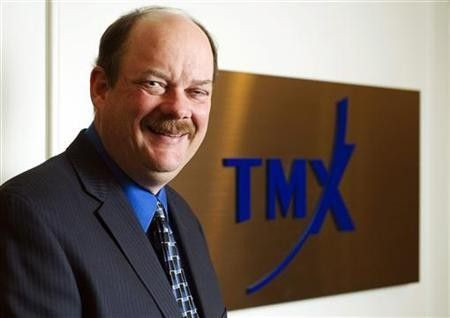TMX says junior miners retain cashraising appetite

The Toronto Stock Exchange, home to the largest number of mining companies globally, has seen capital raising in the sector remain resilient this year despite volatile markets, with a strong pipeline ahead, a senior executive said on Monday.
The exchange -- home to more than 1,600 miners, many of them junior exploration companies -- has seen the sector raise C$10.9 billion ($10.7 billion) in the year to October on the venture exchange and main market.
That compares with C$11.2 billion in the same period a year ago.
It has been slower, but not by much ... To put this in context, the mining index is down about a third, said Ungad Chadda, senior vice-president of the Toronto Stock Exchange, whose remit includes all aspects of listings.
It speaks to the resilience of our marketplace, and to the stage of development of our companies. We have a lot of exploration and development companies that have certain milestones and maintenance obligations.
Chadda, speaking on the sidelines of a mining conference in London, said roughly half the capital raised this year was done so on the venture exchange, home to emerging companies. The vast majority was raised via secondary listings.
A lot of these companies are so junior that they need to raise capital even to maintain interest levels. Unfortunately it has been a little bit more dilutive, he said.
The Toronto exchange stretches from tiny early-stage companies to heavyweights such as Barrick Gold (ABX.TO: Quote), the world's largest gold miner, but is best known as a venue for junior firms, particularly in the exploration space.
These are typically at the sharp end of fundraising in a downturn, and many are finding themselves squeezed between banks tightening their purse strings and tougher equity markets.
But Chadda said the pipeline for capital raising was strong, with gold, iron ore and rare earths in focus on the mining side.
We feel the pipeline that we have in terms of new listings, domestically and internationally, appears strong, Chadda said.
And we have a very strong interest level as we look at companies internationally, in Latin America, the U.S. and here in the UK, from companies that are already listed.
Dual listings are increasingly common among miners, with Canada a popular venue for Australian companies that are active in gold and Africa, seeking a higher valuation, and even miners listed on London's AIM hoping to raise additional funds.
As London attracts lucrative business from Russian large-cap miners, Chadda said Toronto was keen to court larger companies to round off and has had interest from a few mega caps.
Mining is the largest section of the Toronto exchange, followed by oil and gas.
Most miners arrive on the exchange not via IPOs, but through alternative routes including reverse takeovers, dual listings or specific structures offered by the exchange to help raise funding for exploration purchases.
TMX Group, which operates the Toronto Stock Exchange, agreed in October to support a C$3.8 billion bid from Maple Group, comprising 13 of Canada's most powerful financial institutions.
Competition authorities, however, have raised concerns about the offer.
Chadda declined to comment on the deal but said it was unlikely to affect day-to-day listings operations.
© Copyright Thomson Reuters 2024. All rights reserved.





















